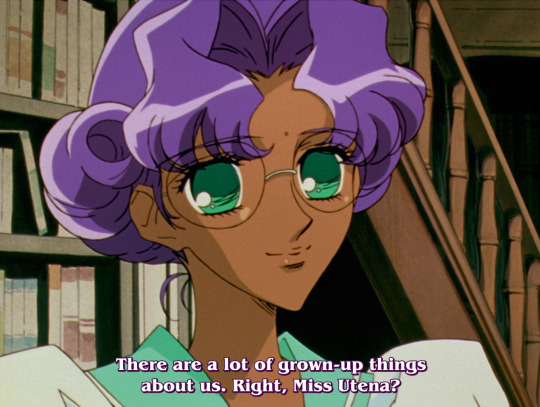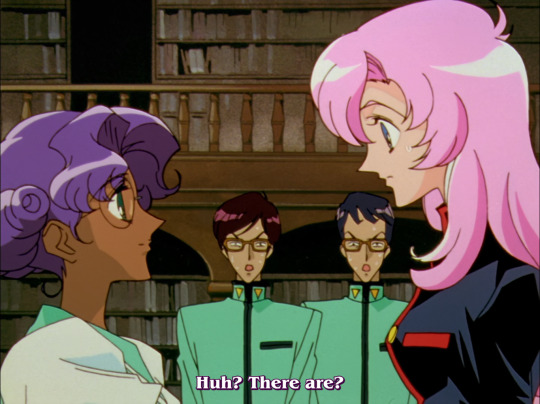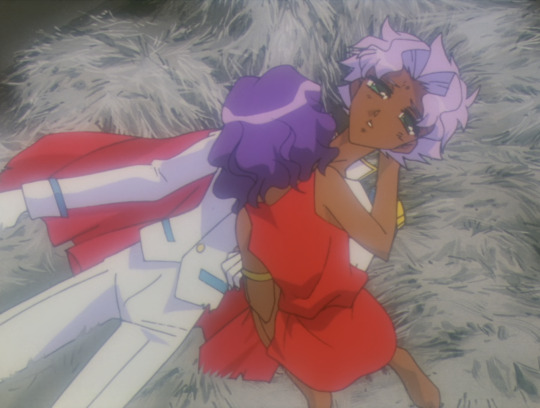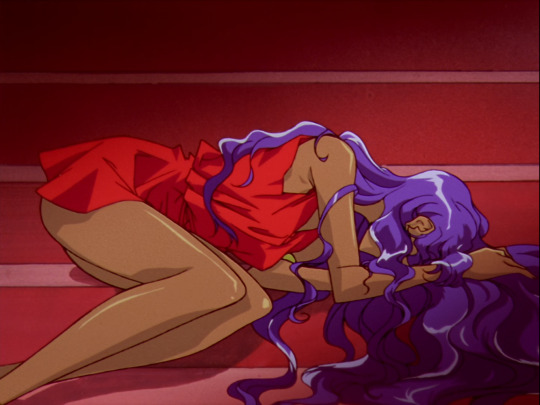#to be clear im not referring to Platonic ideals for once but instead using the word in the more common sense
Explore tagged Tumblr posts
Text
in analysis of RGU and Ikuhara works more broadly, I've often drawn a distinction between uncomplicated childhood bonds and fraught adolescent relationships. I didn't come up with this comparison on my own, but was influenced by Enokido Yōji, who often touches on it in interviews. however, in my own writing, I've pinpointed sexuality as the cause of tension in relationships as characters age. while I was always aware that the issue was more complicated than that, I'm now questioning whether sexuality was the answer in the first place. further thoughts under the cut.
when I first set out to write this piece, I was planning on framing it in terms of platonic versus romantic love, but I'm not sure that distinction is meaningful in the context of Ikuhara works. in the Kotani interview, Ikuhara outlined a far more meaningful contrast between "romance" and "romantic":
"Romantic" has become a word for girls, and "romance" basically a word for men. In short, "romantic" is something that comes from the other. Like, I'll make you into a princess, or I'll arrange a wedding at a wonderful location; it's a world which a prince will appear from and return into. While "romance" is something like venturing into the trackless wilderness, that kind of world.
I can't see "romantic love" in any other way than how Ikuhara has described here--it is an illusion sold to people, the idea that someone else will come into their lives and fulfill them. in RGU, this can clearly be seen in the fantasy of the prince, but it manifests in Ikuhara's other works as well.
given that, I think it makes more sense to compare the platonic and the sexual, which brings us back to the original topic: the contrast between childhood and adolescent relationships. it's easy to say that childhood relationships are uncomplicated because of the lack of sexual tension, whereas adolescent (and adult) relationships are fraught due to it. but there are a lot of assumptions wrapped up in that way of thinking.
it's been common across many cultures to equate youth with virginity and sex with adulthood. this conception is played with in Utena a couple times, most notably in episode 18 where Tsuwabuki tries to grow up more quickly by gaining sexual experience.


this scene clearly contrasts Utena and Anthy on this front; Anthy appears to be teasing, perfectly in control of the situation, while Utena is vaguely aware of what's being implied and is uncomfortable with it. certainly, the most sexual characters in RGU appear to be the most powerful: Anthy, Akio, and Touga. but are they the most mature? does sexual experience equate to adulthood?
Enokido is enlightening on this topic. from his privacy files:
It is said that a human being gains whatever he lost in exchange. So what did Touga gain in exchange [for his abuse]? It was the sense of alienation from being abused every night and seeing his innocent friend and sister during the day. The alienated self. [..] And it is out of this awareness of alienation that you come to obtain a higher humanity and sexual self-awareness. In the TV series, Saionji always felt that he was one step behind Touga. Although the two are more or less equal in terms of ability, what Saionji lacked was that sense of alienation.
both Anthy and Touga were sexually abused as children. as Enokido describes, they may have gained something through it. but what they gained was not adulthood.


I'm certainly not the first person to note that the dress Anthy wears in episode 38 is the same one we see her in as a child. through this visual cue, the show is hinting at the fact that Anthy, as adult as she may seem, is still frozen at the time of her terrible trauma. that's not to discount her canniness or maturity--I do believe she is mature in many ways--yet the little girl inside her remains.
and what of Akio? isn't he just a parody of what a child believes adulthood to be? all his bad boy hijinks fail to even make him an interesting person, much less a mature one.
now let's consider the platonic. I once argued that all Ikuhara works are about friendship, and I stand by that. given that I think friendship is a serious issue in Ikuhara, not to be taken for granted, I shouldn't dismiss it as belonging to the realm of childhood; rather, it's the end goal for all his characters.
Enokido claims people experience easy platonic love in childhood but lose it along the way and thus pine away for it. if it's not sexuality that creates the rift he refers to, what is it?
I won't deny that sexuality may be a factor, but to name it as the cause is a mistake. in the first place, are children non-sexual beings? many adults believe so, but an entry-level knowledge of child psychology tells us otherwise. there is a physiological change that occurs during puberty, typically a major one; I'm not denying that. rather, I'm questioning whether it's the absence of sexuality that makes childhood relationships uncomplicated, or if it's the lack of awareness of social norms surrounding sexuality and gender that's the cause.
I don't want to go too far here; Yurikuma provides plenty of examples of lust acting as a barrier to true love. however, need lust and love always be in conflict? Sarazanmai seems to say that without the libidinal power of our desire, we will not be able to connect with one another.
I'd like to come back to Ikuhara's definition of "romance," as opposed to "the romantic." a romance is a journey in which one sets out into a pathless land. in true Ikuhara fashion, he depicts this metaphorically--romance in RGU means deciding for oneself how to think, how to live. in the pathless land, distinctions are no longer needed, including the distinction between the platonic and the sexual. the hope is to obtain love; sex is a way to express love, if one so chooses, but need not carry any more connotations with it than that. that's a vision of adulthood I can get behind.
#to be clear im not referring to Platonic ideals for once but instead using the word in the more common sense#commentary#ikuhara#the ideas i discussed here were well explored by Oshimi Shuzo in Okaeri Alice btw#def influenced me
18 notes
·
View notes